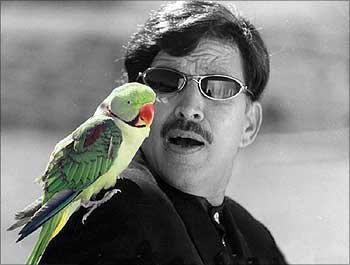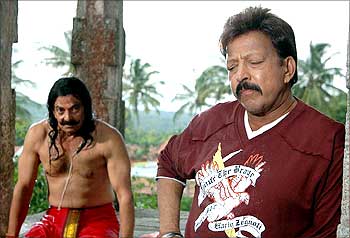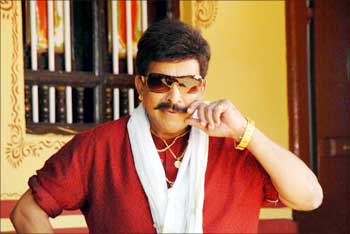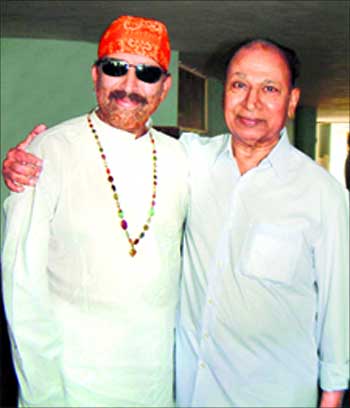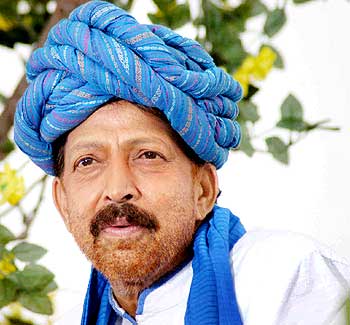 | « Back to article | Print this article |
Vishnuvardhan: The silent superstar
I woke up to the news of the sudden demise of a man Kannada filmdom was so used to knowing as Vishnuvardhan.
The name on his passport, though, would have actually read: Mysore Narayan Rao Sampath Kumar. Born 1950. Mysore. Vidyaranyapuram if I may add.
As I sit down to pen my thoughts on the man whom I had liked, admired and enjoyed watching on screen right from the 1970's, there comes a visage so handsome and smart that I yearn to see it all over again.
A man with a simply mind boggling cinematic repertoire and vision called Kanagal Puttanna, a director of such immense range, that the Kannada film industry has never been able to replace even to this day; was the one who triggered the entry of a 23-year-old named Sampath Kumar onto celluloid in 1973, after rechristening him Vishnuvardhan, ostensibly more cinematically appealing and glamorous sounding than Sampath Kumar.
The film was Nagarahavu based on a novel by the legendary Ta Ra Su. A story set amidst the glorious ruins of historic Chitradurga, about a boy named Ramachari belonging to a traditional madhwa Brahmin family.
Rebellious, haughty, hot headed, turbulent and emotional. But with a heart of gold which yearned to be understood and loved. A boy who falls in love with his classmate's sister, a role essayed by Aarti, an affair short-lived since the girl's parents are simply against the alliance, because Ramachari is not a nice guy in whose hands the future and fate of their daughter cannot be entrusted.
Ramachari and his father-like benefactor and guide and teacher, the venerable and extremely caring Chamayya meshtru; a character the illustrious Ashwath from good old Saraswathipuram played to such wonderful perfection that it brings tears of poignancy to my eyes even to this day; their tender relationship, the rules of which were seemingly unwritten.
The much maligned Ramachari finally committing suicide by jumping off a cliff along with his old classmate and new found beau, Margaret. An act of sheer mutiny against the iron-clad brahminical religiosity of those times.
Actor Vishnuvardhan is born
The portrayal was stunning. Actor Vishnuvardhan was born. The song Haavina Dwesha, Hanneradu Varusha still lingered on in memory long after the curtains came down at theatres across the state.
Then came the famous Gandada Gudi, set in the beautiful jungles of Kakanakote. The great master, Rajkumar, was a range forest officer and Vishnuvardhan, his lost brother, kidnapped and reared by the criminal Venkatappa Naika, who grows up to be his bete noire.
As the years rolled by and Vishnuvardhan began to get into the consciousness of Kannada cinema, it began to emerge that he had class and a style that many of his contemporaries could not match.
An endearing mannerism on screen punctuated by the slight shrug of the shoulders with the index finger pointing ahead, and a walk all his own with one side of his body slightly bent to a side, either while approaching his lady love or making a stern point to the villain before embarking on the smashing up of the bad man's face.
As for his dialogue delivery, it was impeccable and unambiguous with the exact intonation and clarity; a voice not so resonating but undoubtedly impressive. His words were uttered with the right mixture of a pause and a flow depending on the mood of the scene and the situation at hand.
Vishnu, in his heydays, was perhaps the most handsome of them all; the thick mop of wavy hair beneath which lay two extremely expressive eyes and an aquiline nose. The smile was so endearing and the gait so apt, although he was not extremely tall or even athletic. Only Ananth Nag came close with his dashing looks. But then, he belonged to a completely different genre of acting.
The 1970's and 80's saw some highly entertaining films made. And Vishnu invariably featured in most of them including the critically acclaimed off-beat Vamsha Vruksha. Singapore Nalli Raja Kulla, the first ever Kannada film to be shot in a foreign locale, Nagarahole -- Rajendra Singh Babu's first film as director -- with Vishnu too just then married to the famous star Bharathi; Sose Thanda Sowbhagya; a film made by a man called called Ankalagi and his friends, men who made films with a social theme and message in those days. Bhootaiyana Maga Aiyyu, that made a telling impact too came about.
Directors swore by Vishnu
Naaniruvude Ninagaagi, Asadhya Aliya, Guru Shishayaru, the most expensive Kannada film of its time with a budget of Rs 25 lakh; the highly successful Bandana; names that come to immediate thought.
There was a time in the industry when director Bharghava, cinematographer Raja Ram and Vishnuvardhan combined as a team to make a series of films that captured the imagination. As many as 25 films in fact.
Jana Nayaka, Karunmayi, Ondagi Baalu, Dr Krishna, Bangarda Kalasa and Hrudayavanta as I can recall. Not epochal by any stretch of imagination but then, those were times when the entire family went out to watch a film in a theatre in a celebratory mood on a holiday perhaps, and never came back disappointed. No blood, no gore, no dubious dialogues, no double entendre. Simple plain story telling with a message thrown in somewhere. The good son, the sacrificing brother, the concerned village leader, the protector and saviour of women's dignity, the nice guy around the block, if you will.
Directors Tiptur Raghu, KSR Das and Joe Simon swore by Vishnu. Naga Kala Bhairava, Kalla Kulla, Khaidi, Rudra Naga, Sahasa Simha, Nanna Rosha Nooru Varusha, Simha Jodi; they all helped make Vishnuvardhan a name that cannot be forgotten.
Then there was Muttina Haara, a story much ahead of its time, of the futility of war, made by Rajendra Singh Babu. It unfortunately did not do too well at the box office although it was lavishly mounted and shot in exotic locales in the Himalayas.
It was a measure of Vishnu's concern for the plight of the producer that he agreed to star in a film called Neenu Nakkare Haalu Sakkare. Directed by Dorai-Bhagawan, it went on to rake in the monies for the same producer who had lost quite a bit of it with Muttina Haara.No politics for this superstar
Vishnuvardhan, like his legendary contemporary Rajkumar, studiously kept himself away from the lure of politics. There was a time in the early 1980's when Gundu Rao as chief minister and Jeevaraj Alva as the minister of Kannada and culture were after Vishnu. Vishnu refused. The story goes that it was mainly Ambarish among others who dissuaded him from getting into the murky world of politicking.
Another icon of the Kannada film world, Dwarakish, and Vishnu had a rather roller coaster ride as far as their personal and professional relationship went. One of the biggest producers of his time apart from being a famous comedian, Dwarakish made films like Indina Ramayana and Rayaru Bandaru Maavana Manege with Vishnu, as I recollect through the fogginess of my memory. They also acted in scores of films together right from the 1970's.
But strangely their relations were not consistent. It is said that the souring of the partnership would happen every now and then because of the more voluble Dwarakish making statements to the media about his displeasure of Vishnu's association with certain producers in the industry. 'Kobri' Manju, Soorappa Babu and Rehman, all producers, made a lot of films with Vishnu at various times. Was this the reason one does not know. Eventually the patch up would happen. The most famous Aptha Mitra too came into existence. Vishnu through all this never uttered a word.
Like when he was almost persecuted by 'fans' of Rajkumar during the early part of his career when an innocuous incident concerning a rifle during the making of Gandhada Gudi was held so seriously against the young Vishnu.
His posters were torn to pieces, cow dung splashed on them at most places, vicious attacks on him in the press, the maligning of his reputation, the bitterness with he was perceived by certain sections of the industry, the loneliness of battling all these forces of vice and wickedness. Vishnu had gone through this all. And the point is, he not only survived but made a mark as a fine actor and a man too.
Not once did he call a press conference or shout or rail or complain in public about the unjustness of it all. All he did in his characteristic style was to point a hand heavenwards every time a journalist asked him for his reactions. And press the same hand to his heart.The end of the script
One can imagine the anguish and discouragement, the disillusionment and pain that could have come about his way during those hard times when the state was made to believe by vested interests in the film industry that he had attempted to 'kill' Rajkumar during that infamous incident up on Masale Betta in the Kakankote jungles during the making of Gandada Gudi.
Although the two men met in public at various functions, with Vishnu even touching Rajkumar's feet in reverential acceptance of his seniority, I'm sure the wedge could never be removed from his heart.
I heard that Vishnuvardhan had taken to the pursuit of adhyatma. Long sessions with Bannanje Govindacharya of Udupi and all that. Why, he himself had begun to look like a Sufi saint, clothed in flowing white robes with a white cloth covering his head and a string of large beads running down his neck.
Maybe there was an inner calling in him to make an attempt to understand the unknown; to delve into the dark depths of spirituality and convince himself of the reason for his existence. To endeavour to unravel the mystery of life and feel it. As a man and as an actor.
By then, the greatest director up in the skies high above had come to the end of his script for Vishnuvardhan. He decided to write the final line of the story of a man who came from one of the bylanes of Vidyaranyapuram in Mysore to go on to become one of the most famous men of Karnataka.
Vishnuvardhan breathed his last early Wednesday. His time had come to meet up with Him, strobe lights and all.
